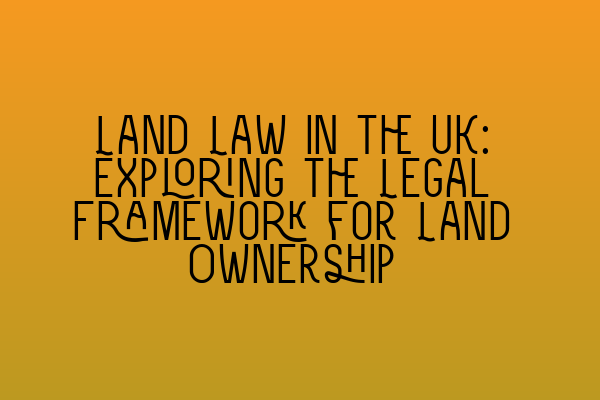Land Law in the UK: Exploring the Legal Framework for Land Ownership
Introduction:
As a solicitor specializing in property law, it is essential to have a thorough understanding of land law in the UK. The legal framework for land ownership is complex and multifaceted, encompassing various principles, statutes, and case law that govern how land is owned, transferred, and managed. In this blog post, we will delve into the intricacies of land law, exploring the key concepts and legal principles that underpin land ownership in the UK.
I. The Concept of Land Ownership:
Land ownership in the UK is based on the principle of freehold, which grants individuals the right to own land outright. Freehold ownership provides the highest level of control and permanence over land, allowing individuals to sell, transfer, or pass on their land to future generations. It is worth noting that even though freehold grants exclusive ownership rights, certain restrictions and regulations may apply, such as planning regulations and easements.
II. Leasehold Ownership:
Alongside freehold ownership, leasehold ownership is also a prevalent form of land ownership in the UK. In a leasehold arrangement, a person is granted the right to occupy and use a property for a set period, typically measured in years. The leaseholder pays an annual ground rent to the freeholder and is subject to certain obligations outlined in the lease agreement. Leasehold ownership is commonly found in apartment buildings and is governed by a complex set of statutory regulations, such as the Leasehold Reform Act 1967 and the Commonhold and Leasehold Reform Act 2002.
III. Transfer of Land:
The transfer of land plays a crucial role in property transactions, and the legal requirements surrounding land transfers are extensive. In the UK, land transfers must be done in writing, typically through a document known as a conveyance or transfer deed. The transfer of land must be registered with the Land Registry to establish legal ownership and protect the rights and interests of both parties involved. It is worth noting that certain transfers, such as those involving leases of more than seven years, require additional formalities, such as being executed as a deed.
IV. Land Registration:
Land registration is an integral part of the UK’s land law system, aiming to provide certainty and transparency in land ownership. The Land Registry oversees the registration of land and properties in England and Wales, maintaining an up-to-date record of all registered estates and interests in land. The registration process involves submitting an application to the Land Registry, providing evidence of ownership, and paying the necessary fees. Once registered, the owner’s details and any existing rights, such as mortgages or easements, are recorded in the register.
V. Easements and Covenants:
Easements and covenants are important legal concepts that affect land ownership and use. An easement is a right granted to one party to use another party’s land for a specific purpose, such as accessing a neighboring property or laying utility cables. Easements are legally binding and can be created by express agreement, prescription, or necessity. On the other hand, covenants are enforceable promises or obligations that are usually contained in the transfer deed. They may restrict certain activities or require certain actions to be taken, such as maintaining a fence or not altering the property’s appearance.
VI. Land Disputes and Resolutions:
Land disputes can arise due to various reasons, such as boundary disputes, rights of way, or breaches of restrictive covenants. Resolving these disputes often requires legal intervention, and methods of dispute resolution include negotiation, mediation, and court action. It is crucial for a property solicitor to have a comprehensive understanding of land law and the relevant case law to effectively advise clients and navigate the complexities of land disputes.
Conclusion:
Understanding the legal framework for land ownership is essential for property solicitors and professionals in the UK. The concepts discussed in this blog post only scratch the surface of land law, and further exploration is necessary to gain a comprehensive knowledge of this intricate field. As the legal landscape continues to evolve, staying up-to-date with the latest legislation and case law is crucial to providing effective and accurate advice to clients.
At SQE Property Law & Land Law, we offer comprehensive preparation courses for the SRA’s Solicitors Qualifying Examination (SQE) that cover all aspects of property law and land law. Our courses include mock exams and practice questions, ensuring you have the skills and knowledge needed to succeed. For more information on our SQE 1 and SQE 2 preparation courses and the upcoming exam dates, visit our website.
Related Articles:
– SQE 1 Practice Exam Questions
– SQE 1 Practice Mocks FLK1 FLK2
– SQE 2 Preparation Courses
– SQE 1 Preparation Courses
– SRA SQE Exam Dates
